Saturday, March 17, 2012
Saint Patrick's Day Fun, Part 3: The Music
You will notice that this year, it is not all the Clancy Brothers and Tommy Makem, though I love them dearly, God rest their souls.
Had to replace some embedded clips from years past that had been taken down.
Makem and Clancy, The Rambles Of Spring
The Orthodox Celts, The Star Of the County Down
Ronnie Drew and the Dubliners, Dublin In the Rare Auld Times
Mary Black, Óró 'sé do bheatha 'bhaile
Johnny McEvoy, The Spanish Lady
John McDermott, The Minstrel Boy
The Dropkick Murphys, The Wild Rover
Cherish The Ladies, The Ballad of the Fox Hunter
Danny Doyle, Whiskey On A Sunday
Foster & Allen, Nancy Myles
The Clancy Brothers and Tommy Makem, Portlairge
The Rankin Family, Mo Run Geal, Dileas
The Dubliners, Seven Drunken Nights
The Dublin City Rambers, Molly Malone
Celtic Woman, The Spanish Lady
Paddy Reilly, Carrickfergus
Tommy Makem and the Makem and Spain Brothers, Paddy Kelly's Brew
The Wolfe Tones, Serjeant William Bailey
The Clancy Brothers and Tommy Makem
The Clancy Brothers And Tommy Makem, Isn't It Grand, Boys?
The Corrs & The Cheiftains, A Shindig Medley
The Blarney Lads, The Irish Rover and the Rakes Of Mallow
Davey Arthur & The Fureys, It's A Long Way From Clare To Here
Sean Dunphy, Delaney's Donkey
Luke Kelly & The Dubliners, The Monto
Jim McCann, Grace
And You Have To Have Danny Boy
Liam Clancy, The Patriot Game
The Irish Rovers, The Unicorn
Makem & Clancy, The Town Of Ballybay
The High Kings, The Rocky Road to Dublin
The Chieftains, Lillibulero/The White Cockade
Robbie O'Connell, Kilkelly, Ireland
The Clancy Brothers & Tommy Makem, Johnny McEldoo
The Dubliners, The Dublin Fusiliers
The Clancy Brothers And Tommy Makem, The Juice Of the Barley
Ronnie Drew & The Dubliners, The Parting Glass
Had to replace some embedded clips from years past that had been taken down.
Makem and Clancy, The Rambles Of Spring
The Orthodox Celts, The Star Of the County Down
Ronnie Drew and the Dubliners, Dublin In the Rare Auld Times
Mary Black, Óró 'sé do bheatha 'bhaile
Johnny McEvoy, The Spanish Lady
John McDermott, The Minstrel Boy
The Dropkick Murphys, The Wild Rover
Cherish The Ladies, The Ballad of the Fox Hunter
Danny Doyle, Whiskey On A Sunday
Foster & Allen, Nancy Myles
The Clancy Brothers and Tommy Makem, Portlairge
The Rankin Family, Mo Run Geal, Dileas
The Dubliners, Seven Drunken Nights
The Dublin City Rambers, Molly Malone
Celtic Woman, The Spanish Lady
Paddy Reilly, Carrickfergus
Tommy Makem and the Makem and Spain Brothers, Paddy Kelly's Brew
The Wolfe Tones, Serjeant William Bailey
The Clancy Brothers and Tommy Makem
The Clancy Brothers And Tommy Makem, Isn't It Grand, Boys?
The Corrs & The Cheiftains, A Shindig Medley
The Blarney Lads, The Irish Rover and the Rakes Of Mallow
Davey Arthur & The Fureys, It's A Long Way From Clare To Here
Sean Dunphy, Delaney's Donkey
Luke Kelly & The Dubliners, The Monto
Jim McCann, Grace
And You Have To Have Danny Boy
Liam Clancy, The Patriot Game
The Irish Rovers, The Unicorn
Makem & Clancy, The Town Of Ballybay
The High Kings, The Rocky Road to Dublin
The Chieftains, Lillibulero/The White Cockade
Robbie O'Connell, Kilkelly, Ireland
The Clancy Brothers & Tommy Makem, Johnny McEldoo
The Dubliners, The Dublin Fusiliers
The Clancy Brothers And Tommy Makem, The Juice Of the Barley
Ronnie Drew & The Dubliners, The Parting Glass
Labels: Being Irish
Saint Patrick's Day Fun, Part 2: Skellig Michael

I have often used an allusion in a sort of intellectual shorthand, and it recently occurred to me that a sizable chunk of even my well-informed audience may not get it.
I sometimes speak (justifiably) of the decline of traditional morality in rather apocalyptic terms, adding that there is no safe place, no "Skellig Michael" to which the civilized may repair to wait out the latest triumph of barbarism (gay marriage, overwhelming immigration, political correctness, safety Nazis, high taxes, Islamicization of Europe, environmental weirdness, vegetarianism, what have you).
Well, the reference to Skellig Michael comes from my varied reading. Four books in particular have shaped this little intellectual shortcut. Kenneth Clark in Civilization wrote that:
"Looking back from the great civilizations of twelfth-century France or seventeenth-century Rome, it is hard to believe that for quite a long time-almost a hundred years-Western Christianity survived by clinging to places like Skellig Michael, a pinnacle of rock eighteen miles from the Irish coast, rising seven hundred feet out of the sea."
Clark's theme was picked up and amplified by Thomas Cahill in his recent bestseller How the Irish Saved Civilization. Cahill's book is about the very phenomenon that Clark mentioned in his first chapter, the survival of Western Civilization.
You see, at the time of the barbarian takeover of the declining Roman Empire, civilization was in quite a plight. Learning declined markedly. Even high culture declined precipitously. In the looting of the pelf of the empire, many of the works of classical culture were lost. The Germanic warlords who came to replace other Roman officials in actual charge out in the provinces were often illiterate. They did nothing to encourage literacy or to preserve the Graeco-Roman literary deposit. While the Church preserved some of Graeco-Roman culture on the continent, she and her agents could not hold all together.
A great deal was preserved in the island hermitage/monasteries of the Irish, who had absorbed Roman culture through the work of St. Patrick and his successors. Skellig Michael, a particularly uninviting location in the Northern Atlantic, was one of those places where the traditions of Graeco-Roman culture and writings were preserved by the Irish monks until Europe had calmed down enough to allow for this learning to be re-exported to it.
Irish monasticism was not the safe, comfortable sort of Saint Benedict and those who follow him. It was the white martyrdom of the desert fathers, harsh, almost brutally ascetic in ways Saint Benedict rejected so that monasticism could be followed by many, rather than just the elite ascetics. It sought out desert places, wastes, inaccessible islands, deep forests. And there it enacted sometimes harsh penances, like the Cross Vigil, in which a monk held out his hands in the posture of the Lord on the cross for days or weeks at a time. Sometimes, these monks would make the Cross Vigil waist-deep in freezing water.
Their greatest enemy was not the lack of women or material goods. Indeed, they considered themselves as athletes in training for Heaven. Such deprivations were just routine. No. The real enemy was depression, acedia, or the noonday devil "the destruction that wasteth at noonday," in the words of the Psalmist, the feeling, which uncannily comes in the middle of the day, that you have made no progress, that you are wasting your time, indeed your life. I have, for the first time in my life, come to know this scourge myself in the last decade. A formidable enemy indeed, one that I am not sure I have conquered. Indeed, it seems to return, in one guise or another, every few days.
But they also kept libraries and scriptoria, and spent some of their time studying such literary works as their limited involvement with the greater civilization of the continent before its collapse afforded them.
Once Europe had recovered somewhat from the initial shock of the fall of classical civilization and the breakdown of government of the Western Empire, Irish monks, venturing forth from fastnesses like Skellig Michael roamed about France, Germany, and Italy, bringing with them copies of the books from their monasteries, books in which much of Plato and Aristotle, Cicero and Ovid were preserved, some works that Europe had not seen in a hundred years and more. These Irish monks gained great influence in the Merovingian, and later in the Carolingian courts.
The period in which Ireland, in the form of its monks, "saved civilization" was roughly from the death of St. Patrick to the time of Charlemagne. Then, in rapid succession, new waves of barbarian invaders, Vikings, mercilessly plundered the Irish monasteries, attacking even remote Skellig Michael in 823, only a few years after the death of Charlemagne. Duns Scotus was the last great figure in this Irish Renaissance.
Skellig Michael itself has been described by the local (Newburyport) Irish-American author James Charles Roy in his superb book The Road Wet, The Wind Close: Celtic Ireland. He explored the place for a couple of bleak days. It is indeed from his description a desolate spot. It is indeed hard to imagine that here, a large part of western civilization's written heritage was preserved.
"Skellig Michael now stands before us....Even from afar it looks menacing, unfriendly, barren, seemingly a perfect cone rising from the sea. jet-black in colour and everywhere jagged, sharp. There doesn't seem to be a smooth place anywhere."
Nevertheless, Roy is probably correct in calling it the "very essence of Celtic Ireland."
Today, ithe island's inhabitants are three lighthouse keepers who rotate every few months to lessent he chances of going mad, puffins, rabbits, and various seabirds. The island has two peaks. The higher one has a Way of the Cross, after a local fashion. In the vale between the two peaks, under a windswept spit known as "The Saddle of Christ," is the monastery. The monastery was built of dry-laid stone, and consists of 6 clochans, or dwelling huts, circular and beehive shaped. There are two stone oratories.

The monastery was probably built around 650 A.D. It was almost literally carved out of the rock of the island. It is not certain when the Way of the Cross was developed. It consists of "The Needle's Eye," a narrow vertical shaft in the rock about 20 feet high which must be climbed, "The Stone of Pain," a smooth rock 14 feet high which must be scrambled up, and "The Spindle":
"...a long narrow fragment of rock, projecting from the summit of this frightful place, over a raging sea (700 feet below-GTF); and this is walked to by a narrow path only two feet in breadth, and several steps in length. Here the devotees, women as well as men, get astride of this rock, and so edge forward, until they arrive at a stone cross...and here, having repeated a Pater Noster. Returning from thence concludes the penace."
The cross on "The Spindle" was usually kissed by the pilgrim, which required getting very far out onto the ledge.
In Slouching Towards Gomorrah, Judge Robert Bork, perhaps the most prescient observer of our culture of the present age, sees a new barbarian invasion. This invasion that threatens western culture today is almost entirely from within.
The new barbarism takes the form of a decline of standards, a coarsening of public life and discourse, and decline in educational achievement, and standards. It is vile rap music, played very loudly. It is political correctness destroying the study of history and forcing history through the unnatural prism of womyn's studies, African-American studies, gay and lesbian studies, etc. It is immigration run amok, so that a tidal wave of people unable or unwilling to conform themselves and their families to the American Way (the English language and the Anglo-Saxon culture, Christianity and democratic pluralism combined with free enterprise) It is drugs and the culture of dependency on government transfer payments. It is a loss of objective truth and morality and a rise of moral relativism. It is the abortion culture, the gay rights culture, the equality-at-any-price-to-civilization culture that dominates the fields of law, journalism, academia, increasingly the helping professions, and government service. It is ever-more invasive government intruding into areas of personal behavior that were never regulated before, while allowing mayhem to rage in other areas.
Bork sees this barbarism as all-engulfing, its reach being co-equal with the spread of television, popular music, liberal social attitudes, and the nanny state. Looking back to how western civilization in 450-850 was able to survive the barbarian onrush by clinging to rocky outcroppings like Skellig Michael, Bork sees little possibility of survival now.
There are gated communities, conservative publications, Latin Mass parishes, TV-less families, and homeschooling. But nowhere can a traditionalist parent spank without fear of the DSS worker showing up on your doorstep with a warrant and two cops to take your children away if you dare "abuse" them by spanking. The barbarians will not let us withdraw to a safe place, a Skellig Michael. Their reach is all-encompassing. It is everywhere the writ of a modern western government runs. No one was able to stop the British legal system from jailing that farmer who shot two burglars breaking into his home for the third time.
So that, my friends, is what I mean when I say that there will be no Skellig Michaels this time. There are no safe enclaves where traditional life can flourish in the midst of the liberal take-over. Civilization as we know it faces extinction.
Labels: Being Irish
Saint Patrick's Day Fun, Part 1: The Food
Here we are, at that day on which we are entitled (by annually issued indult of the Archdiocese of Boston) to a relaxation of Lenten austerity in order to honor Ireland's patron, Saint Patrick. It has now been almost a month since I tasted meat of any kind.
Corned beef is Jewish, not Irish. Irish immigrants here in the US picked it up from their Jewish neighbors, and it has, in the last 30 years, made an appearance in Ireland. But it isn't Irish in origin. Smoked shoulder, however, is, as the Irish are great pig farmers.

Here are some more foods you can have:
Limerick Ham
Limerick is that very depressing gray place depicted in Angela's Ashes. It is just across the Shannon from where my family is from, Ennis in County Clare. To the Irish, ham is a cured leg of pork. Traditionally, Limerick Ham is smoked over juniper branches. Whole hams should be steeped in cold water overnight before cooking but this is not necessary with smaller joints. The ham in this recipe is not really baked but rather finished off in the oven after having been marinated in cider.
3-5 lb ham pre-cooked
cider to cover
1/2 cup brown sugar
1 tsp mustard
20 whole cloves
Cover the ham with fresh apple cider (from the produce department; frozen at this time of year, not the clear apple juice sometimes called "cider" from the juice aisle) and cover with plastic wrap in the refrigerator for 2 days. Take out the ham and stud with whole cloves. Mix the sugar and mustard and rub well into the surface of the ham. Bake in a pre-heated oven for a further 10 minutes to the 1 lb at 400°F.
Adapted from the Appletree Press' A Little Irish Cookbook.
Chicken and Leek Pie
10-12 inch pie pastry
11/2 lb of seasoned boneless chicken breasts
4 1 inch-thick Slices ham steak
4 large leeks, cleaned/chopped
1 large onion, chopped
Salt
freshly ground black pepper (or 4-pepper blend w/ allspice)
1/2 tsp ground mace or nutmeg
3 cups cream of chicken soup
In a deep 1 - 1 1/2 quart dish, place layers of the chicken, the ham, leeks and onion, adding the mace, nutmeg and seasoning, then repeating the layers until the dish is full. Add the stock, then dampen the edges of the dish before rolling out the pastry to the required size. Place the pastry over the pie and press the edges down well. Crimp them with a fork. Make a small hole in the center. Roll out the scraps of pastry and form a leaf or rosette for the top. Place this very lightly over the small hole. Brush the pastry with milk, and bake at moderate heat, 350F, for 25-30 minutes. Cover the pastry with damp greaseproof paper when partially cooked if the top seems to be getting too brown. Gently heat the cream. When pie is cooked, remove from oven. Carefully lift off the rosette and pour the cream in through the hole. Put back the rosette and serve. (This pie forms a delicious soft jelly when cold.)
Baked Stuffed Herring
4 TBSP Breadcrumbs (heaping)
1 TBSP Parsley, chopped
Small egg, beaten
Juice and rind of lemon
1 pinch Nutmeg
Salt and pepper
8 Herrings, cleaned
2 cups Hard cider
Bayleaf, well crumbled
Fresh ground pepper
First make the stuffing by mixing the breadcrumbs, parsley, beaten egg, lemon juice and peel, and salt and pepper. Stuff each of the fish with the mixture. Lay fish in an ovenproof dish, close together; add the cider, crumbled bayleaf and salt and pepper. Cover with foil and bake at 350F for about 35 minutes.
From Traditional Irish Recipes.
Tom Fitzpatrick's Champ
8 large russets (I like Yukon Gold)
2 cups heavy cream
1/2 pound butter
fresh or dried chives to taste
fried or dried onions to taste
salt to taste
pepper to taste
1/4 pound butter
1 pound Irish back bacon
Cut a strip 1/2 inch wide along the circumference of the spuds. This gives them better flavor, and allows for easier peeling once they have been boiled. Then boil them in their jackets.
Fry up the Irish back bacon. Irish back bacon is more like cured pork than our smoked breakfast bacon. Once the back bacon is done, dry it off with paper towels, and cut off and remove the fat and dice up the choice pieces.
Peel the spuds, and place them in a large bowl and mash them with the cream, the 1/2 pound of butter (or more, if you like) chives, onions, salt and pepper. Mix them up and bring the spuds to a consistency you like. I prefer firm, smooth, and very creamy. Add in the back bacon and stir.
To serve, mound up the champ on each plate, and hollow out a crater at the top. Here, put in the additional butter sliced up so so that it melts. As you eat forkfuls of champ, dip them in the crater of butter. Sinfully rich and delicious!
Black Pudding With Vegetable Casserole
2 Shannon Traditional Black Puddings, skinned and sliced
2 potatoes, peeled and diced
2 carrots, pared and sliced
1 large leek, sliced
2 onions, peeled and sliced
1/4 small white cabbage, shredded
1 can red kidney beans, drained and rinsed
Optional: 1 chicken buillon cube
Salt & pepper to taste
2 tablespoonfuls of oil
Put the prepared onions, carrots, potatoes and leek into a large non-stick skillet with about 4 cups of boiling water. Add stock cube if desired. Cover and cook until the vegetables are almost tender, for 25 to 30 minutes. Add the cabbage and the kidney beans and cook for 5 minutes more. Saute the slices of black pudding in oil until they are crisp on the outside. Gently stir into vegetables and simmer for 10 minutes. Add the seasoning and serve hot with bread or rolls.
Serves 4 to 6
Irish Soda Bread, Fitzpatrick Family Version
2 C. flour
1 t. baking soda
1/2 t. salt
1/2 t. nutmeg
1 1/2 T. sugar
6 T. butter
2/3 C. raisins, brown or golden or mixed
2 t. caraway seeds
1 C. buttermilk
Preheat oven to 375°F.
In a large bowl sift together the flour, baking soda, salt, nutmeg, and sugar. Using a pastry blender or fingertips, work the shortening into the flour until the consistency is the same as that of small peas. Stir in the raisins and caraway and mix to distribute evenly.
Gradually stir in the buttermilk, 1/4 cup at a time, using only enough to allow the dough to come together. Knead the dough for 1 - 2 minutes.
Shape the dough into a round loaf and place on a greased baking sheet. Cut an X on the top and over the sides of the loaf. Bake for 45 minutes or until the bread sounds hollow when tapped.
Cool on a rack.
Great heated with butter melting over the top.
Lemon Curd
4 tablespoons unsalted butter
1/2 cup sugar
1/2 cup fresh lemon juice
4 egg yolks
1 tablespoon grated lemon peel
In saucepan, combine all ingredients except lemon peel. Stirring
with wooden spoon, cook over lowest heat, being careful not to
let mixture boil or yolks curdle. Cook until mixture coats back
of a spoon. Pour into small bowl and stir in lemon peel. Allow
to cool.
Makes 1/2 cup. Great on hot soda bread!
Irish Cream
1 cup whisky (Jameson's)
1 can condensed milk
3 eggs
1 tablespoon Hershey's chocolate syrup
1 tablespoon vanilla
Blend and refrigerate
Irish Whisky Cake
8 ounces Raisins
Grated rind of 1 lemon
150 milliliters Irish Whisky
6 ounces Softened butter
3 Eggs
6 ounces Soft brown sugar
6 ounces Plain flour
1 pinch Salt
1 pinch Ground cloves
1 teaspoon Baking powder
Juice of 1 lemon
8 ounces Confectioners' sugar
Warm water as needed
Put the raisins and grated lemon rind into a bowl with the whiskey, and leave overnight to soak. Grease a 7-inch cake pan, and line the bottom with parchment; preheat oven to 350F. Cream the butter and sugar until light and fluffy. Separate the eggs and sift the flour, salt, cloves and baking powder into a bowl. Beat the yolks into the butter and sugar one by one, including a spoonful of flour and beating well after each addition. Gradually add the whiskey and raisin mixture, alternating with the remaining flour. Do not overbeat at this stage. Finally, whisk the egg whites until stiff and fold them into the mixture with a metal spoon. Turn into the prepared pan and bake in the preheated oven for about 1 1/2 hours, or until well risen and springy to the touch ~- or test with a skewer: when it comes out clean, the cake's ready. Turn out and cool on a wire rack.
Meanwhile, make the icing by mixing the lemon juice with the sieved confectioners' sugar and just enough water to make a pouring consistency. Put a dinner plate under the cake rack to catch the drips, and pour the icing over the cake a tablespoonful at a time, letting it dribble naturally down the sides. Don't worry if a lot of it ends up on the plate underneath -- just scoop it up and put it on top again. When the icing has set, it can be decorated with crystallized lemon slices if you like.
Walnut Mince Tart
1 (9-inch) unbaked pastry shell
1/2 cup sugar
2 tablespoons flour
1/8 teaspoon salt
2 eggs, lightly beaten
2 tablespoons melted butter
1 cup chopped walnuts
1 (27-ounce) jar mincemeat
Refrigerate unused half for up to 3 days or freeze, double-wrapped, for up to a month.
Preheat the oven to 400° F. In a large bowl, combine the sugar, flour, and salt. Add the eggs and mix well. Add the melted butter, walnuts, and mincemeat. Spoon into the pastry shell. Bake for 15 minutes; reduce oven temperature to 325° F, and bake for 50 minutes longer, or until the filling is slightly puffed and firm. Remove from the oven and let cool on a rack for 15
minutes.
Serve warm or at room temperature with whipped cream or vanilla ice cream. Serves 6 to 8.
Corned beef is Jewish, not Irish. Irish immigrants here in the US picked it up from their Jewish neighbors, and it has, in the last 30 years, made an appearance in Ireland. But it isn't Irish in origin. Smoked shoulder, however, is, as the Irish are great pig farmers.

Here are some more foods you can have:
Limerick Ham
Limerick is that very depressing gray place depicted in Angela's Ashes. It is just across the Shannon from where my family is from, Ennis in County Clare. To the Irish, ham is a cured leg of pork. Traditionally, Limerick Ham is smoked over juniper branches. Whole hams should be steeped in cold water overnight before cooking but this is not necessary with smaller joints. The ham in this recipe is not really baked but rather finished off in the oven after having been marinated in cider.
3-5 lb ham pre-cooked
cider to cover
1/2 cup brown sugar
1 tsp mustard
20 whole cloves
Cover the ham with fresh apple cider (from the produce department; frozen at this time of year, not the clear apple juice sometimes called "cider" from the juice aisle) and cover with plastic wrap in the refrigerator for 2 days. Take out the ham and stud with whole cloves. Mix the sugar and mustard and rub well into the surface of the ham. Bake in a pre-heated oven for a further 10 minutes to the 1 lb at 400°F.
Adapted from the Appletree Press' A Little Irish Cookbook.
Chicken and Leek Pie
10-12 inch pie pastry
11/2 lb of seasoned boneless chicken breasts
4 1 inch-thick Slices ham steak
4 large leeks, cleaned/chopped
1 large onion, chopped
Salt
freshly ground black pepper (or 4-pepper blend w/ allspice)
1/2 tsp ground mace or nutmeg
3 cups cream of chicken soup
In a deep 1 - 1 1/2 quart dish, place layers of the chicken, the ham, leeks and onion, adding the mace, nutmeg and seasoning, then repeating the layers until the dish is full. Add the stock, then dampen the edges of the dish before rolling out the pastry to the required size. Place the pastry over the pie and press the edges down well. Crimp them with a fork. Make a small hole in the center. Roll out the scraps of pastry and form a leaf or rosette for the top. Place this very lightly over the small hole. Brush the pastry with milk, and bake at moderate heat, 350F, for 25-30 minutes. Cover the pastry with damp greaseproof paper when partially cooked if the top seems to be getting too brown. Gently heat the cream. When pie is cooked, remove from oven. Carefully lift off the rosette and pour the cream in through the hole. Put back the rosette and serve. (This pie forms a delicious soft jelly when cold.)
Baked Stuffed Herring
4 TBSP Breadcrumbs (heaping)
1 TBSP Parsley, chopped
Small egg, beaten
Juice and rind of lemon
1 pinch Nutmeg
Salt and pepper
8 Herrings, cleaned
2 cups Hard cider
Bayleaf, well crumbled
Fresh ground pepper
First make the stuffing by mixing the breadcrumbs, parsley, beaten egg, lemon juice and peel, and salt and pepper. Stuff each of the fish with the mixture. Lay fish in an ovenproof dish, close together; add the cider, crumbled bayleaf and salt and pepper. Cover with foil and bake at 350F for about 35 minutes.
From Traditional Irish Recipes.
Tom Fitzpatrick's Champ
8 large russets (I like Yukon Gold)
2 cups heavy cream
1/2 pound butter
fresh or dried chives to taste
fried or dried onions to taste
salt to taste
pepper to taste
1/4 pound butter
1 pound Irish back bacon
Cut a strip 1/2 inch wide along the circumference of the spuds. This gives them better flavor, and allows for easier peeling once they have been boiled. Then boil them in their jackets.
Fry up the Irish back bacon. Irish back bacon is more like cured pork than our smoked breakfast bacon. Once the back bacon is done, dry it off with paper towels, and cut off and remove the fat and dice up the choice pieces.
Peel the spuds, and place them in a large bowl and mash them with the cream, the 1/2 pound of butter (or more, if you like) chives, onions, salt and pepper. Mix them up and bring the spuds to a consistency you like. I prefer firm, smooth, and very creamy. Add in the back bacon and stir.
To serve, mound up the champ on each plate, and hollow out a crater at the top. Here, put in the additional butter sliced up so so that it melts. As you eat forkfuls of champ, dip them in the crater of butter. Sinfully rich and delicious!
Black Pudding With Vegetable Casserole
2 Shannon Traditional Black Puddings, skinned and sliced
2 potatoes, peeled and diced
2 carrots, pared and sliced
1 large leek, sliced
2 onions, peeled and sliced
1/4 small white cabbage, shredded
1 can red kidney beans, drained and rinsed
Optional: 1 chicken buillon cube
Salt & pepper to taste
2 tablespoonfuls of oil
Put the prepared onions, carrots, potatoes and leek into a large non-stick skillet with about 4 cups of boiling water. Add stock cube if desired. Cover and cook until the vegetables are almost tender, for 25 to 30 minutes. Add the cabbage and the kidney beans and cook for 5 minutes more. Saute the slices of black pudding in oil until they are crisp on the outside. Gently stir into vegetables and simmer for 10 minutes. Add the seasoning and serve hot with bread or rolls.
Serves 4 to 6
Irish Soda Bread, Fitzpatrick Family Version
2 C. flour
1 t. baking soda
1/2 t. salt
1/2 t. nutmeg
1 1/2 T. sugar
6 T. butter
2/3 C. raisins, brown or golden or mixed
2 t. caraway seeds
1 C. buttermilk
Preheat oven to 375°F.
In a large bowl sift together the flour, baking soda, salt, nutmeg, and sugar. Using a pastry blender or fingertips, work the shortening into the flour until the consistency is the same as that of small peas. Stir in the raisins and caraway and mix to distribute evenly.
Gradually stir in the buttermilk, 1/4 cup at a time, using only enough to allow the dough to come together. Knead the dough for 1 - 2 minutes.
Shape the dough into a round loaf and place on a greased baking sheet. Cut an X on the top and over the sides of the loaf. Bake for 45 minutes or until the bread sounds hollow when tapped.
Cool on a rack.
Great heated with butter melting over the top.
Lemon Curd
4 tablespoons unsalted butter
1/2 cup sugar
1/2 cup fresh lemon juice
4 egg yolks
1 tablespoon grated lemon peel
In saucepan, combine all ingredients except lemon peel. Stirring
with wooden spoon, cook over lowest heat, being careful not to
let mixture boil or yolks curdle. Cook until mixture coats back
of a spoon. Pour into small bowl and stir in lemon peel. Allow
to cool.
Makes 1/2 cup. Great on hot soda bread!
Irish Cream
1 cup whisky (Jameson's)
1 can condensed milk
3 eggs
1 tablespoon Hershey's chocolate syrup
1 tablespoon vanilla
Blend and refrigerate
Irish Whisky Cake
8 ounces Raisins
Grated rind of 1 lemon
150 milliliters Irish Whisky
6 ounces Softened butter
3 Eggs
6 ounces Soft brown sugar
6 ounces Plain flour
1 pinch Salt
1 pinch Ground cloves
1 teaspoon Baking powder
Juice of 1 lemon
8 ounces Confectioners' sugar
Warm water as needed
Put the raisins and grated lemon rind into a bowl with the whiskey, and leave overnight to soak. Grease a 7-inch cake pan, and line the bottom with parchment; preheat oven to 350F. Cream the butter and sugar until light and fluffy. Separate the eggs and sift the flour, salt, cloves and baking powder into a bowl. Beat the yolks into the butter and sugar one by one, including a spoonful of flour and beating well after each addition. Gradually add the whiskey and raisin mixture, alternating with the remaining flour. Do not overbeat at this stage. Finally, whisk the egg whites until stiff and fold them into the mixture with a metal spoon. Turn into the prepared pan and bake in the preheated oven for about 1 1/2 hours, or until well risen and springy to the touch ~- or test with a skewer: when it comes out clean, the cake's ready. Turn out and cool on a wire rack.
Meanwhile, make the icing by mixing the lemon juice with the sieved confectioners' sugar and just enough water to make a pouring consistency. Put a dinner plate under the cake rack to catch the drips, and pour the icing over the cake a tablespoonful at a time, letting it dribble naturally down the sides. Don't worry if a lot of it ends up on the plate underneath -- just scoop it up and put it on top again. When the icing has set, it can be decorated with crystallized lemon slices if you like.
Walnut Mince Tart
1 (9-inch) unbaked pastry shell
1/2 cup sugar
2 tablespoons flour
1/8 teaspoon salt
2 eggs, lightly beaten
2 tablespoons melted butter
1 cup chopped walnuts
1 (27-ounce) jar mincemeat
Refrigerate unused half for up to 3 days or freeze, double-wrapped, for up to a month.
Preheat the oven to 400° F. In a large bowl, combine the sugar, flour, and salt. Add the eggs and mix well. Add the melted butter, walnuts, and mincemeat. Spoon into the pastry shell. Bake for 15 minutes; reduce oven temperature to 325° F, and bake for 50 minutes longer, or until the filling is slightly puffed and firm. Remove from the oven and let cool on a rack for 15
minutes.
Serve warm or at room temperature with whipped cream or vanilla ice cream. Serves 6 to 8.
Labels: Being Irish
Saint Patrick's Day
Our Patron and Ghostly Father
The Book of Kells
Irish High Crosses
Our Lady of Knock
How To Make a Saint Patrick's Cross Button
How To Make a Saint Brigid's Cross
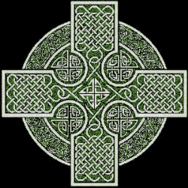
You can print up this Celtic Cross and make an appropriate St. Patrick's Day button out of it.
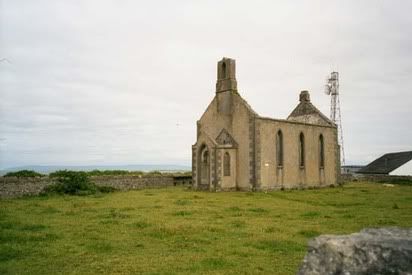

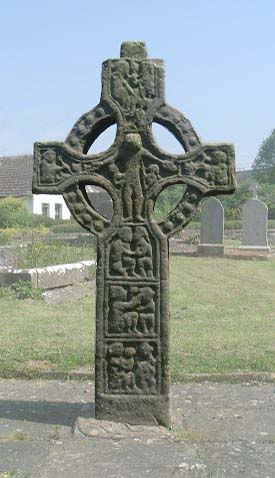

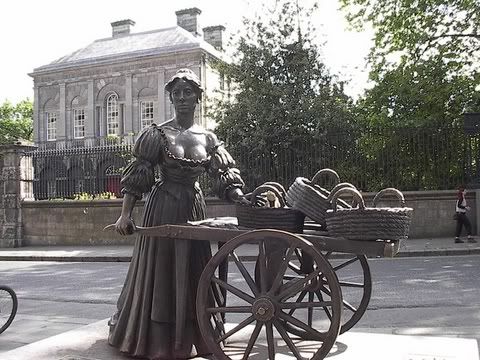

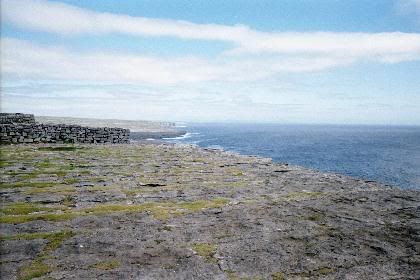



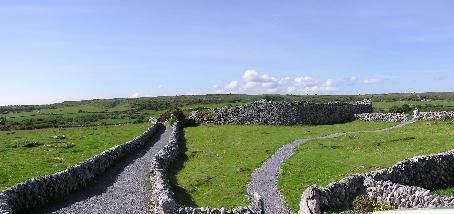
And I'll conclude with my favorite version of St. Patrick's Lorica (Breastplate):
I arise today
Through a mighty strength, the invocation of the Trinity,
Through the belief in the threeness,
Through confession of the oneness
Of the Creator of Creation.
I arise today
Through the strength of Christ's birth with his baptism,
Through the strength of his crucifixion with his burial,
Through the strength of his resurrection with his ascension,
Through the strength of his descent for the judgment of Doom.
I arise today
Through the strength of the love Cherubim,
In obedience of angels,
In the service of archangels,
In hope of resurrection to meet with reward,
In prayers of patriarchs,
In predictions of prophets,
In preaching of apostles,
In faith of confessors,
In innocence of holy virgins,
In deeds of righteous men.
I arise today
Through the strength of heaven, (God the Father)
Light of sun, (God the Son)
Radiance of moon, (Our Blessed Lady)
Splendor of fire, (God the Holy Ghost)
Speed of lightning, (Saint Michael)
Swiftness of wind, (Saint Gabriel)
Depth of sea, (Saint John the Baptist)
Stability of earth, (Saint Joseph)
Firmness of rock. (Saint Peter)
I arise today
Through God's strength to pilot me:
God's might to uphold me,
God's wisdom to guide me,
God's eye to look before me,
God's ear to hear me,
God's word to speak for me,
God's hand to guard me,
God's way to lie before me,
God's shield to protect me,
God's host to save me
From snares of devils,
From temptations of vices,
From everyone who shall wish me ill,
Afar and anear,
Alone and in multitude.
I summon today all these powers between me and all evils,
Against every cruel merciless power that may oppose my body and soul,
Against incantations of false prophets,
Against black laws of pagandom,
Against false laws of heretics,
Against craft of idolatry,
Against spells of witches and smiths and wizards,
Against every knowledge that corrupts man's body and soul.
Christ to shield me today
Against poison, against burning,
Against drowning, against wounding,
So that there may come to me abundance of reward.
Christ with me, Christ before me, Christ behind me,
Christ in me, Christ beneath me, Christ above me,
Christ on my right, Christ on my left,
Christ when I lie down, Christ when I sit down, Christ when I arise.
Christ in the heart and mind of every one who thinks of me,
Christ in the mouth of everyone who speaks of me or to me,
Christ in every eye that sees me or my works,
Christ in every ear that hears me or hears of me.
I arise today
Through a mighty strength, the invocation of the Trinity,
Through belief in the threeness,
Through confession of the oneness,
Of the Creator of Creation.
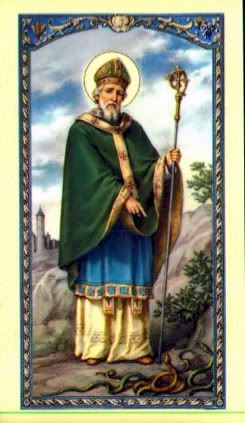

The Book of Kells
Irish High Crosses
Our Lady of Knock
How To Make a Saint Patrick's Cross Button
How To Make a Saint Brigid's Cross

You can print up this Celtic Cross and make an appropriate St. Patrick's Day button out of it.











And I'll conclude with my favorite version of St. Patrick's Lorica (Breastplate):
I arise today
Through a mighty strength, the invocation of the Trinity,
Through the belief in the threeness,
Through confession of the oneness
Of the Creator of Creation.
I arise today
Through the strength of Christ's birth with his baptism,
Through the strength of his crucifixion with his burial,
Through the strength of his resurrection with his ascension,
Through the strength of his descent for the judgment of Doom.
I arise today
Through the strength of the love Cherubim,
In obedience of angels,
In the service of archangels,
In hope of resurrection to meet with reward,
In prayers of patriarchs,
In predictions of prophets,
In preaching of apostles,
In faith of confessors,
In innocence of holy virgins,
In deeds of righteous men.
I arise today
Through the strength of heaven, (God the Father)
Light of sun, (God the Son)
Radiance of moon, (Our Blessed Lady)
Splendor of fire, (God the Holy Ghost)
Speed of lightning, (Saint Michael)
Swiftness of wind, (Saint Gabriel)
Depth of sea, (Saint John the Baptist)
Stability of earth, (Saint Joseph)
Firmness of rock. (Saint Peter)
I arise today
Through God's strength to pilot me:
God's might to uphold me,
God's wisdom to guide me,
God's eye to look before me,
God's ear to hear me,
God's word to speak for me,
God's hand to guard me,
God's way to lie before me,
God's shield to protect me,
God's host to save me
From snares of devils,
From temptations of vices,
From everyone who shall wish me ill,
Afar and anear,
Alone and in multitude.
I summon today all these powers between me and all evils,
Against every cruel merciless power that may oppose my body and soul,
Against incantations of false prophets,
Against black laws of pagandom,
Against false laws of heretics,
Against craft of idolatry,
Against spells of witches and smiths and wizards,
Against every knowledge that corrupts man's body and soul.
Christ to shield me today
Against poison, against burning,
Against drowning, against wounding,
So that there may come to me abundance of reward.
Christ with me, Christ before me, Christ behind me,
Christ in me, Christ beneath me, Christ above me,
Christ on my right, Christ on my left,
Christ when I lie down, Christ when I sit down, Christ when I arise.
Christ in the heart and mind of every one who thinks of me,
Christ in the mouth of everyone who speaks of me or to me,
Christ in every eye that sees me or my works,
Christ in every ear that hears me or hears of me.
I arise today
Through a mighty strength, the invocation of the Trinity,
Through belief in the threeness,
Through confession of the oneness,
Of the Creator of Creation.


Labels: Being Irish, Our Saintly Brethern
Saturday Of the Third Week In Lent

Station Church:
S. Susanna alle Terme di Diocleziano
From The Passion And Death Of Jesus Christ, by Saint Alphonsus de Liguori:
O my Lord, and whom shall I seek but Thee, Who art come from Heaven to earth to seek after me and save me from perdition?
amen.
Devotions for a Lenten Saturday holy hour:
Divine Mercy Chaplet
Seven Penitential Psalms
Prayer of St. Thomas More
Threnus Prayer of Saint Augustine
Stabat Mater Dolorosa
Litany of Our Lady of Sorrows
Sorrowful Mysteries
Labels: Lent
Our Blessed Lady's Saturday In Lent, 4

Remember, O Virgin Mother of God, when you stand in the sight of the Lord, to speak good things for us and to turn away His indignation from us.
Holy Mother, pierce me through,
In my heart each wound renew,
Of my Savior crucified.
Let me to my latest breath,
In my body bear the death,
Of that dying Son of thine.
Be to me, O Virgin, nigh
Lest in flames I burn and die.
In that awful judgment day.
Christ, when Thou shall call me hence,
Be Thy Mother my defense.
Be Thy Cross my victory.
While my body here decays,
May my soul Thy goodness praise,
Safe in paradise with Thee. Amen.
V. Pray for us, O most sorrowful Virgin,
R. That we may be made worthy of the promises of Christ.
Let us pray: Let intercession be made for us, we beseech You, O Lord Jesus Christ, now and at the hour of our death, before the throne of Your mercy, by the Blessed Virgin Mary, Your Mother, whose most holy soul was pierced by a sword of sorrow, in the hour of Your bitter Passion. Through You, Jesus Christ, Savior of the world, Who lives and reigns with the Father and the Holy Spirit, world without end. Amen.
Our Lady of a happy Death, pray for us.
Saint Joseph, pray for us.
Labels: Our Blessed Lady
Labels: Our Blessed Lady
Friday, March 16, 2012
Feast Of the Five Holy Wounds
Friday At the Foot Of the Cross, Lent 4

Ant.
Remember not, O Lord, my offenses, nor the offenses of my fathers, nor takest Thou vengeance upon them.
Psalm 50/51
3 HAVE MERCY ON ME, O God, * according to Thy great mercy; and according to the multitude of Thy tender mercies: * blot out my iniquity.
4 Wash me from my iniquity; * and cleanse me of my sin.
5 For I acknowledge my iniquity, * and my sin is always before me.
6 Against Thee alone have I sinned and done evil in Thy sight; * that Thou mayest be justified in Thy sentence and mayest overcome when judged.
7 For behold, I was conceived in sin, * and in sin my mother conceived me;
8 For behold, Thou hast loved truth, * and the uncertain and hidden things of Thy wisdom Thou hast shown me.
9 Thou shalt sprinkle me with hyssop, and I shall be cleansed, * Thou shalt wash me, and I shall be made whiter than snow.
10 Thou shalt make me hear of joy and gladness, * and the bones Thou hath crushed shall rejoice.
11 Turn away Thy face from my sins, * and blot out all my iniquities.
12 Create in me a clean heart, O God, * and renew a steadfast spirit within me.
13 Cast me not from Thy presence, * and take not Thy holy spirit from me.
14 Restore unto me the joy of Thy salvation, * and strengthen me with Thy spirit.
15 I will teach the unjust Thy ways, * and the wicked shall be converted to Thee.
16 Deliver me from blood guilt, O God, the God of my salvation * , and my tongue shall extol Thy justice.
17 Thou shalt open my lips, O Lord, * and my mouth shall declare Thy praise.
18 For if Thou didst desire sacrifice, I would have indeed given it, * with a burnt offering Thou art not pleased.
19 A sacrifice to God is an afflicted spirit, * a contrite and humbled heart, O God, Thou shalt not despise.
20 Deal favorably, O Lord, in Thy good will with Sion * that the walls of Jerusalem may be built up.
21 Then shalt Thou accept the sacrifice of justice, oblations and whole burnt offerings, * then shall they lay calves upon Thy altar.
GLORY be to the Father, and to the Son, and to the Holy Ghost, as it was in the beginning, is now, and will be forever. Amen.
Prayer Against Lust
Father, I have sinned against heaven and before Thee, and now I am not worthy to be called Thy son. What shall I, wretched that I am, do? For Thy Spirit shall not remain in man, for he is flesh. Oh have mercy on me, have mercy! I attribute to Thy infinite goodness that I am not taken along with the many thousands of the damned, who the cursed abomination of lust casts headlong into Gehenna even today. Shall I therefore sin again? O Jesus, in the love of base pleasures shall I again trample under foot Thy most precious Blood poured forth in the washing away of my sins? Far from it, O Jesus, far from it! I beseech Thee, O Son of the most chaste Virgin Mary to free me from the spirit of fornication. Wash me from my iniquities and cleanse me from my sin. Do not cast me from Thy face nor take Thy Holy Spirit from me!
Ant.
Remember not, O Lord, my offenses, nor the offenses of my fathers, nor takest Thou vengeance upon them.
Labels: Friday At the Foot Of the Cross
Friday Of the Third Week In Lent

Station Church:
S. Lorenzo in Lucina
From The Passion And Death Of Jesus Christ, by Saint Alphonsus de Liguori:
Oh my Lord, I have been one of those unhappy souls who, having received so many graces , lights, and calls have ungratefully forgotten and foresaken Thee. Accept me, for the sake of Thy mercy,now that I return to Thee with a penitent and sorrowful heart, never again to leave Thee. O Treasure of life, O Love of my soul!
Amen.
Devotions for a Lenten Friday holy hour:
Dies Irae
Divine Mercy Chaplet
Seven Penitential Psalms
Prayer of St. Thomas More
Threnus Prayer of Saint Augustine
Devotions To the Holy Cross
Stations of the Cross
Labels: Lent
Thursday, March 15, 2012
The Ides Of March
Mid-Lent Day
Today is the 23rd day since Ash Wednesday. There are 23 more days of Lent after today. At the end of the day, as we drop off to sleep, we will have reached the mid-way point of Lent.
The annual "ease up" during the period from Laetare Sunday (March 18 this year) through Lady Day (March 25 except in years when it is transferred because it falls on a Sunday or during the Triduum), with the local indults for easing of Lenten sacrifice for the feasts of Saint Patrick (March 17) and Saint Joseph (March 19), is a little break when we catch our breath. It comes neatly this year just before the heavy trucking of Passiontide begins.
But now we have the opportunity to assess how we are doing with Lenten prayer, reading, sacrifice, almsgiving, and so on. A midway point is a great opportunity to honestly check on progress and make adjustments (whether buckling down, or easing up if our voluntary sacrifices are proving too burdensome).
Remember, if you have not done so yet, work through a good form for examination of conscience and prepare yourself for a full good confession late in Holy Week, so that you can make a worthy Easter Communion, the only required Communion of the year.
I hope the remainder of Lent is spiritually profitable for you all.
The annual "ease up" during the period from Laetare Sunday (March 18 this year) through Lady Day (March 25 except in years when it is transferred because it falls on a Sunday or during the Triduum), with the local indults for easing of Lenten sacrifice for the feasts of Saint Patrick (March 17) and Saint Joseph (March 19), is a little break when we catch our breath. It comes neatly this year just before the heavy trucking of Passiontide begins.
But now we have the opportunity to assess how we are doing with Lenten prayer, reading, sacrifice, almsgiving, and so on. A midway point is a great opportunity to honestly check on progress and make adjustments (whether buckling down, or easing up if our voluntary sacrifices are proving too burdensome).
Remember, if you have not done so yet, work through a good form for examination of conscience and prepare yourself for a full good confession late in Holy Week, so that you can make a worthy Easter Communion, the only required Communion of the year.
I hope the remainder of Lent is spiritually profitable for you all.
Labels: Lent
Thursday Of the Third Week In Lent

Station Church:
Ss. Cosma e Damiano in Via Sacra (Fori Imperiali)
From The Passion And Death Of Jesus Christ, by Saint Alphonsus de Ligouri:
Yes, my Jesus, into Thy hands I place my life and my death; in Thee I abandon myself entirely, and I recommend my soul to Thee now for the last moments of my life. Receive it into Thy wounds, as Thy Father received Thy spirit, when Thou didst expire on the cross.
Devotions for a Lenten Thursday holy hour:
Dies Irae
Divine Mercy Chaplet
Seven Penitential Psalms
Prayer of St. Thomas More
Threnus Prayer of Saint Augustine
Devotion To the Holy Face
Labels: Lent
Wednesday, March 14, 2012
Wednesday Of the Third Week In Lent

Station Church:
S. Sisto (SS. Nereo e Achilleo)
From The Passion And Death Of Jesus Christ, by Saint Alphonsus de Liguori:
Oh my reviled Lord, Thou art the King of Heaven, the Son of the Most High; Thou surely deservest not to be ill-treated and despised, but to be adored and loved by all creatures. I adore Thee, I bless Thee, I thank thee, I love Thee with all my heart. I repent of having offended Thee. Help me, have pity on me.
Amen.
Devotions for a Lenten Wednesday Holy Hour:
Dies Irae
Divine Mercy Chaplet
Seven Penitential Psalms & the prayers against the Seven Deadly Sins
Prayer of St. Thomas More
Threnus Prayer
Seven Prayers of St. Gregory
Labels: Lent
Tuesday, March 13, 2012
Tuesday Of the Third Week In Lent

Station Church:
S. Pudenziana al Viminale
From The Passion And Death Of Jesus Christ, by Saint Alphonsus de Liguori:
My sweet Lord, if others banish Thee, I will not banish Thee. there was once an unhappy time when I ungratefully banished Thee from my soul; but now I set a greater value on being united with Thee than on the possession of all the kingdoms of the earth. Oh my God, who shall ever be able again to separate me from Thy love?
Amen.
Devotions for a Lenten Tuesday Holy Hour:
Dies Irae
Divine Mercy Chaplet
Seven Penitential Psalms
Prayer of St. Thomas More
Threnus Prayer of Saint Augustine
Devotion of the Seven Last Words
Labels: Lent
Monday, March 12, 2012
Monday of the Third Week In Lent

Station Church:
S. Marco al Campidoglio
From The Passion And Death Of Jesus Christ, by Saint Alphonsus de Liguori:
O my Jesus! Remind me always of the death Thou hast suffered for me, and give me confidence. I tremble lest the devil should make me despair at death by bringing before my view the many acts of treason I have committed against Thee. How many promises have I made never more to offend Thee after the light Thou hast given me! and, after all my promises, I have, with the hope of pardon, again turned my back upon Thee. Then, have I insulted Thee because Thou didst not chastise me? My Redeemer! give me a great sorrow for my sins before I leave this world. I am sorry. O Sovereign Good! for having offended Thee. I promised to die a thousand times rather than abandon Thee. But make me in the mean time feel that Thou hast said to me what Thou didst say to Magdalene - Thy sins are forgiven thee - by giving me, before death, a great sorrow for all my iniquities, otherwise I fear my death will be troubled and unhappy. Be not Thou a terror to me; Thou art my hope in the day of affliction. Jer. 17:17. O my crucified Jesus! be not a terror to me in my last moments. If I die before I have wept over my sins and have loved Thee, Thy wounds and Thy blood will inspire me with fear rather than with confidence. I do not ask of Thee consolations and earthly goods during the remainder of my life; I ask of Thee sorrow and love. O my dear Savior! hear my prayer for the sake of that love which made Thee offer Thy life in sacrifice for me on Calvary. Mary, my Mother! obtain for me these graces, along with holy perseverance till death.
Devotions for a Lenten Monday holy hour:
Dies Irae
Divine Mercy Chaplet
Seven Penitential Psalms
Prayer of St. Thomas More
Threnus Prayer of Saint Augustine
Devotion of the Five Sacred Wounds
Labels: Lent
Sunday, March 11, 2012
The Third Sunday Of Lent

Station Church:
S. Lorenzo fuori le Mura
Devotions for a Lenten Sunday holy hour:
Divine Mercy Chaplet
Seven Penitential Psalms
Prayer of St. Thomas More
Psalter of St. Jerome
Threnus Prayer of St. Augustine
Here is a link to Michael W. Martin's excellent translation of the Psalter Of Saint Jerome. It is too long to post directly here.
From The Passion and Death of Jesus Christ, by Saint Alphonsus de Liguori:
O my God! I thank Thee, for making me now remain at Thy feet and not in hell, which I have so often deserved. But of what use would the life which Thou hast preserved be to me, should I continue to live without Thy grace. Ah! may this never be I have turned my back upon Thee I have lost Thee, O my Sovereign Good! I am sorry for it with my whole heart. Oh, that I had died a thousand times, rather than have offended Thee! I have lost Thee; but the prophet tells me that Thou art all goodness, and that Thou art easily found by the soul that seeks Thee. If I have hitherto fled away from Thee, I now seek Thee, and seek nothing but Thee. I love Thee with all the affections of my heart. Accept me. Do not disdain to give Thy love to a soul that has at one time despised Thee Teach me what I must do in order to please Thee; I am ready and willing to do it. Ah, my Jesus! save this soul, for which Thou hast given Thy blood and Thy life; and, in order to save me, give me the grace always to love Thee in this and in the next life. This grace I hope for through Thy merits. For this I also hope, O Mary! through thy intercession.
From The Liturgical Year, by Abbot Prosper Gueranger, OSB:
Ever since the promulgation of the Gospel, the power of Satan over the human body has been restricted by the virtue of the cross, at least in Christian countries; but this power resumes its sway as often as faith and the practice of Christian piety lose their influence. And here we have the origin of all those diabolical practices, which, under certain scientific names, are attempted first in secret, and then are countenanced by being assisted at by well-meaning Christians. Were it not that God and His Church intervene, such practices as these would subvert society. Christians! remember your baptismal vow; you have renounced satan: take care, then, that by a culpable ignorance you are not dragged into apostasy. It is not a phantom that you renounced at the font; he is a real and formidable being, who, as our Lord tells us, was a murderer from the beginning (Jn. 8:44).
But if we ought to dread the power he may be permitted to have over our bodies; if we ought to shun all intercourse with him, and take no share in practices over which he presides, and which are the worship he would have men give him: we ought, also, to fear the influence he is ever striving to exercise over our souls. See what God's grace has had to do in order to drive him from our soul! During this holy season, the Church is putting within your reach those grand means of victory-fasting, prayer, and almsdeeds. The sweets of peace will soon be yours, and once more you will become God's temple, for both soul and body will have regained their purity. But be not deceived; your enemy is not slain. He is irritated; penance has driven him from you; but he has sworn to return. Therefore, fear a relapse into mortal sin; and in order to nourish within you this wholesome fear, meditate upon the concluding part of our Gospel.
Our Saviour tells us that when the unclean spirit is gone out of a man, he walketh through places without water. There he writhes under his humiliation; it was added to the tortures of the hell he carries everywhere with him, and to which he fain would give some alleviation by destroying souls that have been redeemed by Christ. We read in the old Testament that sometimes, when the devils have been conquered, they have been forced to flee into some far-off wilderness: for example, the holy Archangel Raphael took the devil, that had killed Sara's husbands, and bound him in the desert of upper Egypt (Tob. 8:3). But the enemy of mankind never despairs of regaining his prey. His hatred is as active now as it was at the very beginning of the world, and he says: "I will return into my house, whence I came out." Nor will he come alone. He is determined to conquer; and therefore, he will, if he think it needed, take with him seven other spirits, even more wicked than himself. What a terrible assault is being prepared for the poor soul, unless she be on the watch, and unless the peace, which God has granted her, be one that is well armed for war! Alas! with many souls the very contrary is the case; and our Saviour describes the situation in which the devil finds them on his return: they are swept and garnished, and that is all! No precautions, no defence, no arms. One would suppose that they were waiting to give the enemy admission. Then satan, to make his repossession sure, comes with a sevenfold force. The attack is made; but there is no resistance, and straightways the wicked spirits entering in, dwell there; so that the last state becometh worse than the first; for before there was but one enemy, and now there are many.
Labels: Lent, The Liturgical Year








































































































